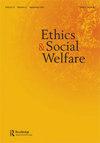推进积极公民的三种政策选择:普遍基本收入、普遍基本服务和社会经济
IF 0.9
Q4 SOCIAL WORK
引用次数: 0
摘要
摘要本文讨论了三个解决传统福利国家局限性的政策理念:全民基本收入(UBI)、全民基本服务(UBS)和社会经济。作为评估这些政策选择的视角,我们提出了积极公民身份的概念,将其视为人们平等的政治影响力与他们所处的制度条件之间的互动和递归过程。虽然关于积极公民身份的社会政策论述集中在增加个人责任还是增强人们的能力之间的辩论,但我们的概念最近将积极公民身份的政治层面集中在人们的能力上,不仅是行使个人自决的能力,而且是行使集体自决的能力。我们的结论是,除了安全和自治的条件之外,有组织的社会合作的机会对于实现人民的政治影响力和支持它的机构之间的良性循环是必要的。关键词:积极公民全民基本收入全民基本服务社会经济福利国家披露声明作者未报告潜在的利益冲突。注1参见Bidadanure (citation, 2019, 492-494)对基本收入问题女权主义争论的评述Gough (Citation2020, 4)认为,瑞银对社会平等具有重要意义,因为它表明,实物福利价值约占底层五分之一人群税后收入的76%,而第四五分之一人群的这一比例为24%,最富有的人群为14%参见Moulaert和Ailenei (Citation2005)对欧洲背景下社会经济的历史概述参见Hendriks和Dzur (Citation2022)从对民主的影响的角度讨论公民主导的治理对集体问题的影响。本研究由韩国教育部资助[资助号:NRF-2021S1A5A2A01070179];日本科学促进会[资助号21KK0030]。chikako Endo是大阪大学人文科学研究生院的副教授。她的研究兴趣包括工作和福利的政治理论,民主理论和社会公民。Young Jun Choi,韩国延世大学公共政策与管理系教授,福利国家研究所所长。他的研究兴趣包括老龄化与公共政策、社会投资政策、创新与社会政策以及东亚福利国家。本文章由计算机程序翻译,如有差异,请以英文原文为准。
Three Policy Alternatives for Advancing Active Citizenship: Universal Basic Income, Universal Basic Services, and Social Economy
ABSTRACTThis article discusses three policy ideas that address the limitations of the traditional welfare state: universal basic income (UBI), universal basic services (UBS), and the social economy. As a lens from which to evaluate these policy alternatives, we develop a concept of active citizenship as an interactive and recursive process between people’s equal political influence and the institutional conditions in which they are placed. While the social policy discourse on active citizenship has centred on the debate between increasing individual responsibilities or enhancing people’s capabilities, our conception recentres the political dimension of active citizenship as people’s capacity, not only to exercise individual self-determination, but also collective self-determination over shared conditions. We conclude that, in addition to the conditions for security and autonomy, opportunities for organised social cooperation are necessary to achieve a virtuous cycle between people’s political influence and the institutions that support it.KEYWORDS: Active citizenshipuniversal basic incomeuniversal basic servicessocial economywelfare state Disclosure statementNo potential conflict of interest was reported by the author(s).Notes1 See Bidadanure (Citation2019, 492–494) for a review of the feminist debate on basic income.2 Gough (Citation2020, 4) argues that UBS has significant implications for social equality by demonstrating that in-kind benefits are worth around 76% of the post-tax incomes of the bottom quintile compared to 24% of the fourth quintile and 14% of the richest.3 See Moulaert and Ailenei (Citation2005) for a historical overview of the social economy in the European context.4 See Hendriks and Dzur (Citation2022) for discussion of citizen-led governance over collective problems from the perspective of their implications for democracy.Additional informationFundingThis work was supported by the Ministry of Education of the Republic of Korea [grant number NRF-2021S1A5A2A01070179]; Japan Society for the Promotion of Science [grant number 21KK0030].Notes on contributorsChikako EndoChikako Endo is Associate Professor at the Graduate School of Human Sciences, Osaka University. Her research interests include the political theory of work and welfare, democratic theory, and social citizenship.Young Jun ChoiYoung Jun Choi is a Professor at the Department of Public Policy and Management, and Director of the Institute for Welfare State Research, Yonsei University in South Korea. His research interests include ageing and public policy, social investment policy, innovation and social policy, and East Asian welfare states.
求助全文
通过发布文献求助,成功后即可免费获取论文全文。
去求助
来源期刊

Ethics and Social Welfare
SOCIAL WORK-
CiteScore
1.60
自引率
20.00%
发文量
36
期刊介绍:
Ethics and Social Welfare publishes articles of a critical and reflective nature concerned with the ethical issues surrounding social welfare practice and policy. It has a particular focus on social work (including practice with individuals, families and small groups), social care, youth and community work and related professions. The aim of the journal is to encourage dialogue and debate across social, intercultural and international boundaries on the serious ethical issues relating to professional interventions into social life. Through this we hope to contribute towards deepening understandings and further ethical practice in the field of social welfare. The journal welcomes material in a variety of formats, including high quality peer-reviewed academic papers, reflections, debates and commentaries on policy and practice, book reviews and review articles. We actively encourage a diverse range of contributions from academic and field practitioners, voluntary workers, service users, carers and people bringing the perspectives of oppressed groups. Contributions might include reports on research studies on the influence of values and ethics in social welfare practice, education and organisational structures, theoretical papers discussing the evolution of social welfare values and ethics, linked to contemporary philosophical, social and ethical thought, accounts of ethical issues, problems and dilemmas in practice, and reflections on the ethics and values of policy and organisational development. The journal aims for the highest standards in its published material. All material submitted to the journal is subject to a process of assessment and evaluation through the Editors and through peer review.
 求助内容:
求助内容: 应助结果提醒方式:
应助结果提醒方式:


